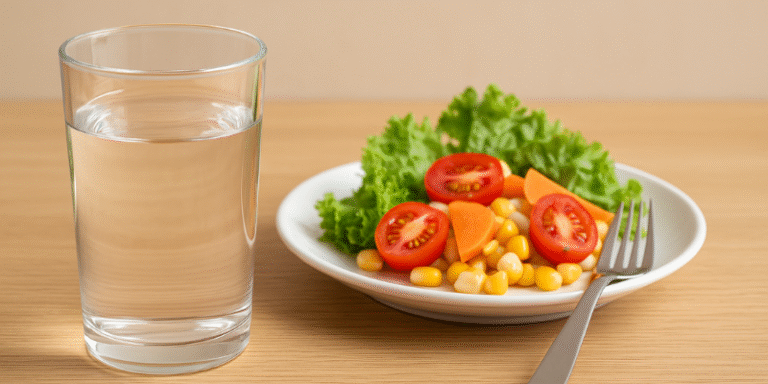The simple act of drinking water before meals has been proposed as a modest but effective strategy to support weight loss. In particular, consuming approximately 500 ml (roughly two cups) of water about 30 minutes prior to each main meal may reduce calorie intake, increase satiety, and, when combined with a calorie‑restricted diet, yield greater weight reduction than dieting alone (Daniels & Popkin 2010; Dennis et al. 2010).
1.0 Mechanisms and Physiological Rationale
1.1 Gastric Distension and Satiety
Pre‑meal water “preloading” causes gastric distension, which stretches the stomach walls and sends satiety signals to the brain, thereby suppressing hunger and leading to lower energy intake at the meal (Dennis et al. 2010; Stookey et al. 2016; MDPI review 2023). A study of non‑obese young adults found that water consumption before eating significantly reduced calorie intake (Stookey et al. 2016).
1.2 Thermogenesis and Metabolic Rate
Drinking cold (approximately 4 °C) water can stimulate thermogenesis—raising noradrenaline levels and triggering a metabolic rate increase by up to 30 per cent for about an hour post‑consumption (NutritionFacts.org 2020; Healthline 2024).
1.3 Replacement of Caloric Beverages
Substituting water in place of sugar‑sweetened or caloric beverages reduces total daily energy intake. Systematic reviews suggest this replacement effect may be more impactful for weight loss than simply increasing plain water intake (Systematic review 2019; NutritionFacts.org 2020).
2.0 Evidence from Clinical Trials
2.1 Randomised Controlled Trials (RCTs)
- Dennis et al. (2010) conducted a RCT in overweight and obese middle‑aged and older adults: those who consumed 500 ml water before meals alongside a hypocaloric diet lost approximately 2 kg more over 12 weeks (a 44 per cent faster rate) compared to dieting alone.
- Another Birmingham University‑led RCT observed that participants preloading before all three main meals lost on average 4.3 kg over 12 weeks versus 0.8 kg in those who preloaded less frequently or not at all (Parretti et al. 2015).
2.2 Systematic Reviews
- A comprehensive review of six RCTs with follow‑up ≥ 12 weeks found mean weight loss ranged from –0.4 kg to –8.8 kg, with an average of about 5.1 per cent body weight lost across interventions that included pre‑meal water, caloric beverage substitution, or increasing water consumption generally. The evidence quality was rated from low to moderate and the trials were relatively short in duration.
- MDPI’s 2023 review reiterated that water before meals induces gastric distension, reduces appetite, boosts satiety, and may stimulate sympathetic activity for increased energy expenditure—but results remain inconsistent across age groups and BMI categories.
2.3 Observational and Survey Data
- The National Health and Nutrition Examination Survey indicated that inadequate hydration correlates with higher body‑mass index (BMI) (Chang et al. 2016).
- A cohort analysis showed that replacing just one sugar‑sweetened beverage with water per day was associated with 0.5 kg less weight gain over four years compared with non‑replacement groups (Pan et al. 2013).
3.0 Practical Recommendations
3.1 How much and when?
- Consume approximately 500 ml (2 cups) of water about 30 minutes before each main meal, providing enough gastric filling without diluting digestive juices excessively.
- Maintain this practice consistently three times daily for at least 12 weeks to observe measurable effects (Dennis et al. 2010; Parretti et al. 2015).
3.2 Synergistic with Hypocaloric Dieting
- The benefits are greatest when combined with caloric restriction and lifestyle improvement: pre‑meal water is not a substitute for balanced dietary habits and physical activity, but rather a low‑cost enhancement to conventional weight loss strategies (Systematic reviews).
3.3 Hydration throughout the day matters
- Sustaining adequate total daily hydration (for adults around 2–2.5 litres including food) supports metabolic processes, prevents dehydration, and may curb false hunger cues (Mayo Clinic 2025; VerywellHealth 2025).
4.0 Limitations and Considerations
- Age and BMI variation: Older adults may derive greater satiety from pre‑meal water due to slower gastric emptying; evidence in younger adults and those with obesity is less uniform (RACGP article; MDPI review).
- Short‑term studies: Most RCTs had durations between 8 to 12 weeks. Few long‑term trials exist, and sustainability of pre‑meal hydration habits is uncertain (Systematic review 2019).
- Quality of evidence: Much of the evidence is rated as low to moderate quality, with potential biases, small sample sizes, and limited demographic diversity (Denis et al.; systematic reviews).
- Contraindications: Individuals with congestive heart failure, severe renal impairment, or certain urinary conditions should consult healthcare professionals before increasing fluid loads pre‑meal, as increased urine output may pose risks (RACGP guidelines)[[].
5.0 Summary of Evidence
| Strategy | Evidence of Effect |
| 500 ml pre-meal water × 3/d | Randomized controlled trials (RCTs) show an additional ~2–4 kg weight loss over 12 weeks |
| Replacement of sugary drinks | Cohort data indicates approximately 0.5 kg less weight gain over 4 years |
| Cold water & metabolism boost | Temporary increase in metabolic rate by up to 30% |
| Overall increased hydration | Associated with lower BMI in population surveys (e.g., NHANES) |
Drinking approximately a pint (500 ml) of plain water about 30 minutes before each main meal appears to be a simple, inexpensive, and safe behavioural strategy that may modestly enhance weight loss outcomes, especially when used alongside a hypocaloric diet and healthy lifestyle. Evidence from RCTs demonstrates modest extra weight reduction over 12 weeks, while systematic reviews and cohort data suggest potential benefits from caloric beverage substitution and better overall hydration.
Although the overall quality of evidence remains low to moderate, the absence of significant adverse effects and the broader health benefits of proper hydration (such as kidney health, digestion, and overall metabolic function) support the inclusion of pre‑meal water as part of holistic weight‑management recommendations (Systematic review 2019; Mayo Clinic 2025; NHS guidelines).
In clinical practice or public health messaging, advising adults without contraindications to drink two cups of water before meals, in conjunction with nutritional advice and physical activity, constitutes a practical and evidence‑based approach to supporting modest weight loss and fostering overall wellbeing.
References
Daniels, M.C. & Popkin, B.M. (2010) Impact of water intake on energy intake and weight status: a systematic review. Nutr. Rev. 68, pp.505–521.
Dennis, E.A. et al. (2010) Water consumption increases weight loss during a hypocaloric diet intervention in middle-aged and older adults. Obesity 18(2), pp.300–307.
Parretti, H. et al. (2015) A bottle of water before each meal could help in weight reduction, University of Birmingham press release Obesity journal data.
Stookey, J.D. et al. (2016) Negative, null and beneficial effects of drinking water on energy intake, energy expenditure, fat oxidation and weight change in randomized trials. Nutrients 8(1):19; and related systematic reviews.
HT. MDPI review (2023) Water intake and adiposity outcomes among overweight and obese populations.
NutritionFacts.org (2020) Drinking two cups of water can increase noradrenaline levels and metabolic rate.
Healthline (2024) How drinking more water can help weight loss.
Mayo Clinic (2025) Water: How much should you drink every day?
VerywellHealth (2025) Adequate hydration aids weight loss and wellbeing.
Systematic review (2019) Effect of water consumption on weight loss: RCT meta‑analysis.
Chang, T. et al. (2016) NHANES analysis: inadequate hydration associated with higher BMI.
NHS / RACGP guidelines (2013) Pre‑meal water consumption guidance and contraindications.









